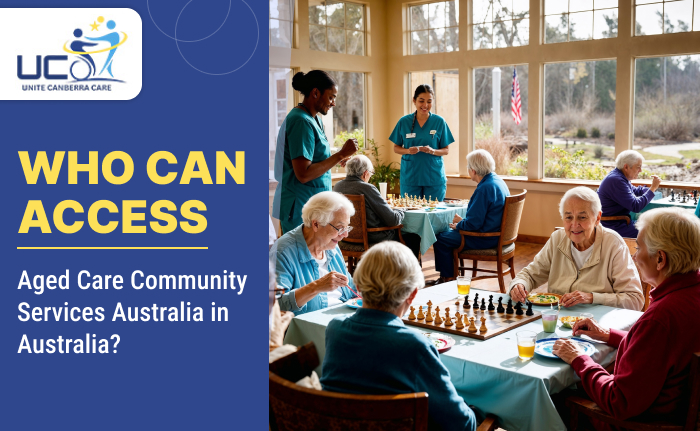Who Can Access Aged Care Community Services Australia in Australia?
 By:Admin
By:Admin
 30 Nov, -0001
30 Nov, -0001

Aged care community services Australia helps older people get support to stay at home. These services offer help with daily tasks while keeping people close to family and friends.
Knowing who can access these services helps families make informed choices about care. Government programs offer different types of help for different needs.
Read on to learn who can access aged care community services Australia.
Basic Age Requirements
- Most aged care community services need people to be 65 years old or older to get government help. This age requirement makes sure help goes to older people who need support the most.
- Aboriginal and Torres Strait Islander people can get services from age 50. This earlier age helps because Indigenous people often have health problems earlier and shorter lives.
- Some programs help younger people with disabilities or serious health problems. These exceptions require medical documentation proving the need for aged care level support and assistance services.
Assesment Process Requirements
- All potential recipients get checked by the Aged Care Assessment Team before getting help. This check looks at what care is needed and suggests the right services for each person.
- The assessment looks at physical health, mental health, friends and family and daily life skills. Trained workers look at each person's needs to match them with the right services.
- Family members can ask for assessments for older relatives who might need help. The process stays private while making sure the older person gets what they need.
Income and Asset Testing
- Most aged care community services Australia programs include means testing to determine individual contribution levels. Higher income or asset levels may result in increased personal contributions toward service costs.
- The check looks at all income, house value, savings and investments. This helps decide how much government help people get and what they need to pay.
- Some basic services remain available regardless of financial circumstances. Emergency support and essential health services often have minimal means testing requirements to ensure accessibility for all.
Health and Care Needs
- People must show they really need help with daily tasks or health care. This includes help with moving around, personal care, taking medicine or keeping the house clean.
- Long-term health problems, recent hospital stays, or getting weaker often qualify people for services. Mental health issues and being lonely may also qualify for community help programs.
- Reports from doctors make applications stronger and help workers understand what care is needed. Medical reports provide evidence supporting the need for ongoing professional assistance and community services.
Services accommodate diverse cultural backgrounds and language preferences to ensure effective communication and appropriate care delivery. Multicultural communities receive specialized programs addressing specific cultural needs and preferences.
Applications require completion of detailed forms documenting personal information, health status and care needs. Supporting documentation from healthcare providers strengthens applications and may reduce processing times significantly.
All in all, aged care community services Australia remains accessible to eligible older Australians meeting specific age, health and assessment requirements. Understanding these criteria helps families navigate the application process and secure appropriate support for ageing relatives.
Professional assessments ensure services match individual needs while testing determines fair contribution levels. Early planning and assessment requests help secure timely access to needed services. Families can trust an NDIS service provider like Unite Canberra Care to ensure smooth transitions into community support programs.

